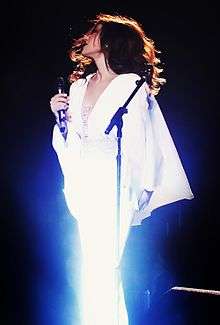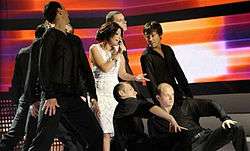Samira Said
| Samira Said | |
|---|---|
 Said at the International Carthage Festival Concert, Tunisia, 15 July 2016 | |
| Background information | |
| Native name | سميرة سعيد |
| Birth name | Samira Bensaïd |
| Also known as | Samira Said |
| Born |
10 January 1958 Sidi Kaceum, Morocco |
| Genres | Arabic music, pop |
| Occupation(s) | Singer, songwriter, record producer, actress, entrepreneur |
| Years active | 1975–present |
| Labels |
Mazzika Alam El Phan Rotana Records |
| Website | SamiraSaid.net |
Samira Said (Arabic: سميرة سعيد, Samira Bensaïd) (born 10 January 1958), is a Moroccan Arabic pop singer who represented Morocco at the Eurovision of 1980.
Career
_honored_Samira_Said_in_2011.jpg)
Samira Said was born and raised in Rabat, Morocco.[1] She began singing at the age of nine, and was discovered on the music program, Mawaheb, broadcast on Royal Moroccan TV. She has recorded many Moroccan songs, such as: "Kifash Tlakina" ("How we Met"), "Fayetli sheftek shi marra" ("I've seen you once"), "Sarkouh" ("They Stole Him"), and "Al Behhara" ("Mariners"). Her singles included "Maghlouba" ("Beaten") and "Wa'ady" ("My Love"). In 1980 she represented Morocco in the Eurovision Song Contest 1980 singing Bitaqat Hub, placing 18th out of the 19 contestants.
Said has recorded "Ben Leef" ("The Circle of Life"), "Sayidati Sadati" (Ladies and Gentlemen"), "Malich Enwan" ("Ready When You Are") and "Akher Hawa" ("Last Love"). She worked with composer Mohamed El Mougi, sang and acted in the film Saaktob Ismak Ala Arrimal ("I Will Write Your Name in the Sand"), which included her singing "Yadamiiti Haddi" ("Tears, Fall from My Eyes"). Other recordings include "Lilet El Ouns" ("Magnificent Get-Together"), "Ech Gab Li Gab" ("A Cut about the Rest"), "Amrak Aajib" ("I Don't Get You"), and "Menghir Sabab" ("For No Reason").
In 2000, she released "Lilah Habeebee", ("One Night, My Love"), the album title track, which went on to win for best video in the Arab world in 2001 at the Cairo Arabic Music Festival. At the 15th annual World Music Awards in 2003, Said won a World Music Award based on worldwide sales figures for that year. Said won the BBC award for world music[2] for the best artist in the Middle East with her album Youm Wara Youm.[3] Said has won more than 40 awards.[4][5]
Mazal was released in October 2013.
Reception
Halina Hopkis called Said "an emblem of trans-nationality in her moves between Morocco and Egypt as well the different awards and shows she has received and participated in as a representative of the Arabic music community".[6]
Said won the Rabab D'or prize at the Tétouan's Voix des Femmes Festival in 2008.[7] She was the winner of the Murex d'Or Award in 2009.[8]
At the 2009 Timitar Festival in Agadir, Said performed for a crowd of 100,000[9] In 2011, the Beirut International Award Festival (BIAF) honored a number of Arab and international singers including Said.[10][11] She has been both credited and criticized for bringing Arab music into the pop-driven, commercially fueled 21st century.[12]
According to Al Ahram, Said's albums have sold over 50 million copies."[5][13][14]
Musical style

Hopkins said "One reason Said’s music is so popular is because of the tonal beauty of her voice against the background instrumentation. The centrality of her voice represents her personal influence in her work.[15]
Philanthropy and humanitarian work
Said spearheaded concerts to draw people together after the 2006 riots in immigrant suburbs across France, and to bring about solidarity between all religions.[16][17][18]
Discography
- El hob elli ana a'aycheh (1975)
- Bitaqat Hub (1977)
- Ben Lif (1979)
- Hikaya (1981)
- Allemnah el Hob (1982)
- Ketr al Kalam (1983)
- Methaya'li (1984)
- Lilet el Ouns (1984)
- Ya Damaiti Haddi (1984)
- Ehki ya Shehrazade (1985)
- Youm akablak Fih (1985)
- Ech gab li gab (1985)
- Amrak ajib en (1986)
- Ana walla anta (1989)
- Moch hatnazel a'anak (1986)
- Sibak (1986)
- Ya ebn al halel (1987)
- Ghariba (1988)
- Sibni louahdi (1988)
- Ensani (1989)
- Ba'adin neta'ateb (1990)
- Choft el amar (1991)
- Hannitlak (1992)
- Khayfa (1992)
- a'ach'a (1993)
- Enta habibi (1995)
- Kolli de echa3at (1996)
- A'al bal (1998)
- Rouhi (1999)
- Laila habibi (2001)
- Youm Wara Youm (2002).[19]
- Har Taraf (duet with Shaan from India)
- Awweeni Beek (2004)
- Ayaam Hayati (2008)
- Be winner ft. Fnaïre (2010)
- Khallouh (2010)
- Mazal (2013)[20][21]
- Ayza Aeesh (2015) "Album"
References
- ↑ libvoice.net. "سميرة سعيد: أنا مصرية الجنسية ومغربية الهوية". Retrieved 6 November 2011.
- ↑ Samira Said: Winner in the Middle East Category; Garth Cartwright; 2002
- ↑ Winners of the 2003 World Music Awards; Oct. 12, 2003; Monaco; Billboard.com;
- ↑ LG Fait Chanter Samira Bensaid; Aujourd’hui le Maroc; 2004
- 1 2 Samira Saeid; the Best-seller Moroccan Singer in Arabic Music History; hitmarker.com Best Sellers; Stars Cafe Entertainment; 2009
- ↑ "Kolleena Ensan: Samira Said's Music as an Interpretation of Moroccan Women's Cultural Identity" (PDF). Halina Hopkins. Valparaiso University. 2011-03-31. Archived from the original (PDF) on November 11, 2013.
- ↑ "Samira Said Glows in Front of 60,000 Fans". Al Bawaba. Associated Newspapers. 2009-06-28. Archived from the original on June 27, 2009. Retrieved 2009-06-28.
- ↑ "Star Scene: Murex D'or Hosts its 9th Award Ceremony". Associated Newspapers. 2009.
- ↑ "Timitar Festival 2009". BBC. BBC Radio 3. 2009.
- ↑ "The Beirut International Awards Festivals (BIAF) honored Samira Said". BIAF. 2012. Archived from the original on November 11, 2013.
- ↑ "Pack of Cards". Al-Ahram Weekly; Issue No. 1076. Associated Newspapers. 15 December 2011. Archived from the original on November 11, 2013.
- ↑ Mowafi, Amy (2010-09-10), Samira Said: The Time of Her Life
- ↑ Samira Said: A Moroccan Star Shines in the Arab World; Magharebia.com; 2009-02-05)
- ↑ Samira Said's record "Ayaam Hayati" Has Been Ranked No. 1 Best-selling Album of 2008; البوم سميرة سعيد يحتل المرتبة الأولى; AlRiyadh.com. (2004-12-16)]
- ↑ "Proceedings of The National Conference On Undergraduate Research" (PDF). Halina Hopkins. Valparaiso University. 2011-03-31. Archived from the original (PDF) on November 11, 2013.
- ↑ "Samira Saeed Fights Terrorism". Al Bawaba. Associated Newspapers. 2006-05-09. Retrieved 2009-12-12.
- ↑ "Concert Pour la Tolérance: Réussi, Oui Mais". GoAgadir. Associated Newspapers. 2007-11-02. Retrieved 2007-11-02.
- ↑ "Concert Pour la Tolérance 2007 à Agadir". news.agadir-souss.com. Associated Newspapers. 2007-09-29. Retrieved 2007-09-29.
- ↑ Garth, Cartwright (2002-02-13), Samira Said: Egypt's top female singer
- ↑ worldmusicawards (2013-10-11), Morocco: Samira Saïd Nominated for Worlds Best Song
- ↑ "Moroccan Diva Samira Said Back with a Great Song in "Darija"". Morocco World News. 12 October 2013. Archived from the original on October 17, 2013.
Further reading
- Women of Fes: Ambiguities of Urban Life in Morocco, by Rachel Newcomb, University of Pennsylvania Press, 2009 - 236 pages. ISBN 0-8122-4124-X, 9780812241242. (English)
- Iraqi Maqam voices of women: an analytical study of the critical technical experience of Iraqi women in singing Almqami, by Hussein Azami, by Hussein Azami, AIRP, 2005 - 316 pages. ISBN 9953-36-677-2, ISBN 978-9953-36-677-7. (Arabic)
- Songs and stories, by Karīm Irāqī, by Karīm Irāqī, Company Whites of Arts and Letters, Volume 1 de Aghānī wa-ḥikāyātuhā, Karīm ʻIrāqī - . (Arabic)
External links
- Official website
- BBC.co.uk; Samira Said: Youm Wara Youm; review by Garth Cartwright; 16 November 2007; BBC
|}